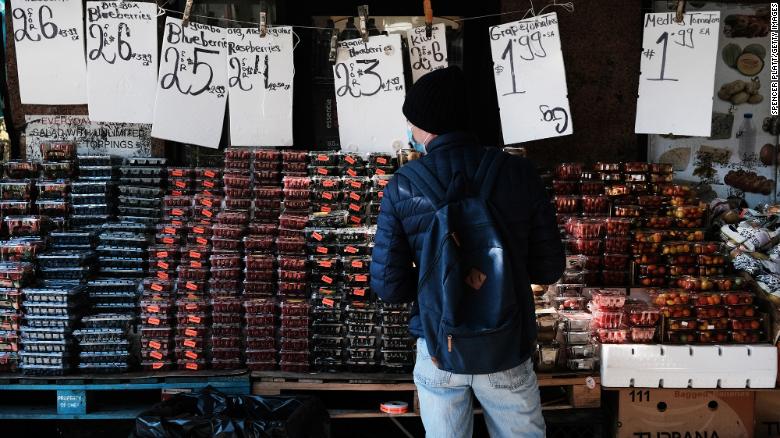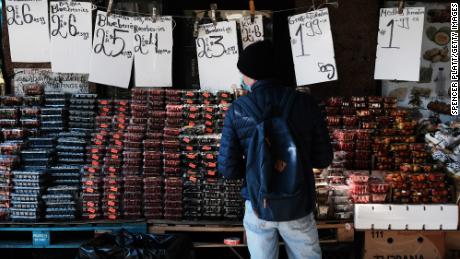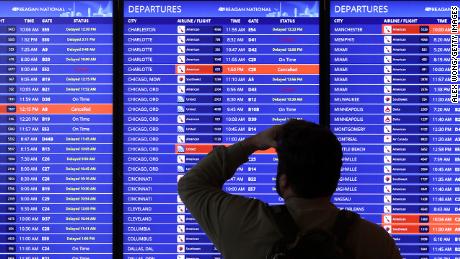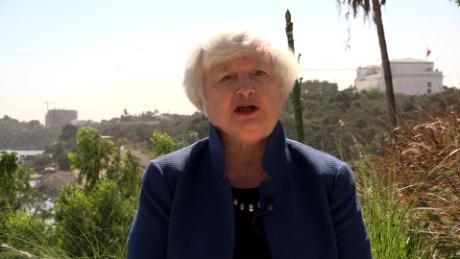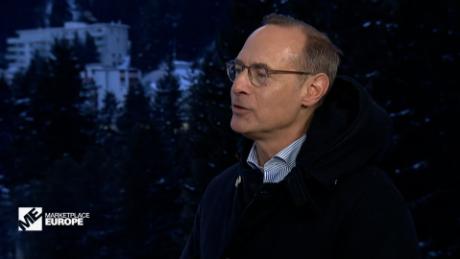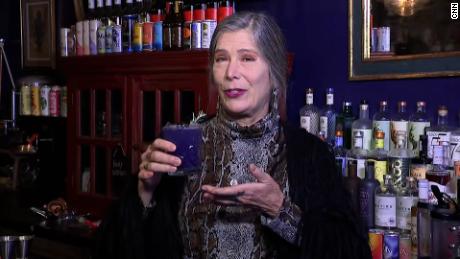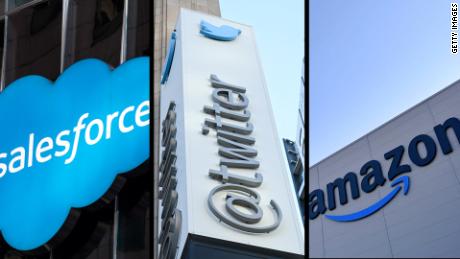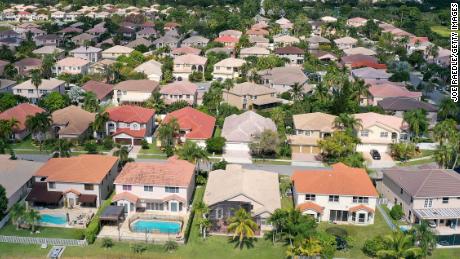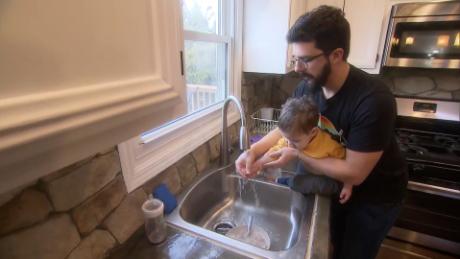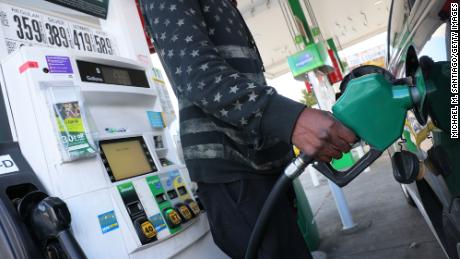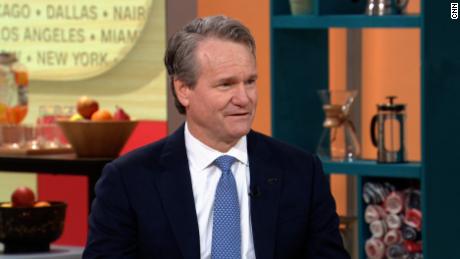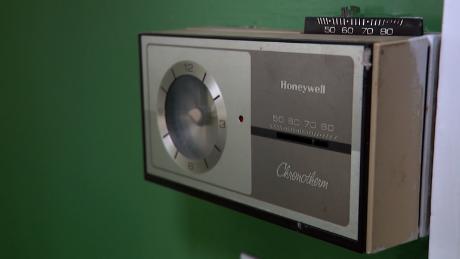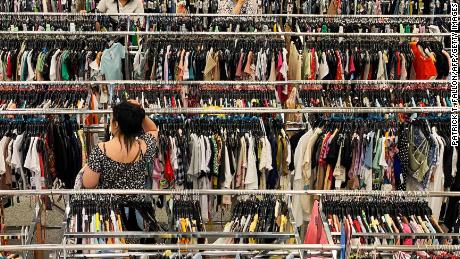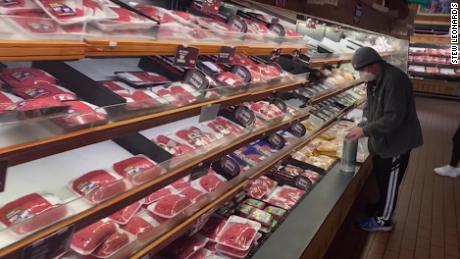New York (CNN Business)The Biden economy is a walking contradiction.
Consumer sentiment is at a 10-year low, tumbling in November to levels unseen even during the height of Covid-19. A staggering 70% of Americans rate the economy negatively in an ABC News-Washington Post poll.
And yet Americans are shopping up a storm, with retail sales soaring in October at the fastest pace since stimulus checks were sent out in March. Walmart, Target (TGT) and Home Depot are booming.
Hiring is strong (much stronger than the government initially thought). And workers are quitting their jobs at a record pace, in large part because they are very confident they can easily find a better job.
Something doesn't add up. And that something has a lot to do with the nation's first inflation scare in decades.
Gas prices are at seven-year highs. Food prices are soaring. New car prices surged in October the most since 1975.
Simply put, the cost of living is going up, and Americans aren't happy about it. Inflation is overshadowing real bright spots in the US economy.
"The economic news is generally good. But inflation is in your face, every day. Some of the most visible prices are up and that makes it seem like the inflation problem is worse than it is," said Gus Faucher, chief economist at PNC.
The good news is that despite elevated inflation and the supply chain crisis, Americans are still shopping. That's crucial because consumer spending makes up two-thirds of the economy.
The October retail sales report, which easily beat expectations, signals the US economy is heading into the holiday shopping season with serious momentum ŌĆö despite the doom-and-gloom signaled by polls.
"People say they are not feeling great about the economy ŌĆö yet they are spending," said Aneta Markowska, chief economist at Jefferies. "I just don't fully believe what the confidence reports are telling us."
Ultimately, if Americans keep spending, then this confidence problem is much more of a political problem for President Joe Biden ŌĆö as opposed to an economic one.
Show of confidence: Workers are quitting like never before
Of course, it's important to note that different people are experiencing different things in today's economy -- especially given all the shockwaves set off by Covid. Some parts of the economy hit the hardest by the pandemic, including the travel industry, are still struggling to recover.
And inflation is most painful to low-income families and those living on fixed income. Social Security cost of living adjustments are coming, but not until next year.
Still, there is more evidence that the overall jobs market continues to recover swiftly from Covid. A surge of hiring in October dropped the unemployment rate to 4.6%, down from nearly 15% in April 2020.
Goldman Sachs expects the jobless rate to slip to 3.5% by the end of next year, matching the 50-year low set before the pandemic.
Although there were concerns about a summer slowdown in hiring, revisions show the government dramatically underestimated job growth between June and September.
The Labor Department marked up its original forecast by a total of 626,000 jobs over that span.
At the same time, a record 4.4 million Americans quit their jobs in September, clear evidence of how much leverage workers have in today's economy.
Biggest price spike since 1990
None of this is to say that inflation isn't a real challenge. It is.
Consumer prices surged in October by the fastest pace since 1990. Inflation has been stronger and lasted longer than the White House, the Federal Reserve and the smart money on Wall Street anticipated.
The most glaring example is the price at the pump. National gas prices stand at $3.41 a gallon today, up from $2.12 a year ago.
Americans do not like high gas prices, and they have a long history of blaming whoever is in the White House, fair or not.
Big picture, there is a growing realization that inflation will stay elevated for months to come, and some argue prices will go even higher before they come back to earth.
Wages are going up sharply amid a war for talent among companies. Yet wages are often not going up by enough to offset higher consumer prices.
Republicans vs. Democrats
The deeply polarized state of America may be amplifying these inflationary concerns.
The University of Michigan's consumer sentiment index shows wide gaps among partisans during both the Trump and Biden administrations along key issues, including jobs and inflation-adjusted income.
"Partisans aligned with the President's party have adopted very positive moods, and those in the opposing camp very negative moods," the University of Michigan report said. "Partisan supporters of one or the other president either mentioned or ignored rising home and stock values, inflation and income growth rates or mentioned or ignored employment or unemployment rates, and so far."
But politics likely does not tell the whole story here.
Consumer sentiment is down across the board, with Democrats, Republicans and independents all giving the economy poorer marks in the University of Michigan survey today than in the spring of 2021. Sentiment dropped most dramatically among Republicans.
And consider that consumer sentiment among Democrats stands at 87 today. That's only slightly better than the low-80s readings in early 2017 after former President Donald Trump took office.
'Big shock to the system'
Another part of the problem is that many Americans have never lived through a period of sticker shock before. Inflation was unusually subdued for the past dozen years, so tame that many economists feared a Japanese-style deflationary spiral that would be hard to get out of.
"Inflation is something that a lot of people have not experienced in their lifetimes. It's a big shock to the system," said Markowska, the Jefferies analyst.
For older Americans, all of this inflation talk brings back bad memories of the runaway inflation of the 1970s and early 1980s. That's despite the fact that today's situation is nowhere near the consumer price spikes back then, which peaked at 14.6% in 1980.
The ironic thing about these inflation fears: A big part of the reason inflation is here today is because demand is booming as the economy recovers from Covid faster than many imagined possible back in March 2020.
Inflation wouldn't be a problem if the US economy was experiencing something like the painfully slow recovery from the Great Recession.
